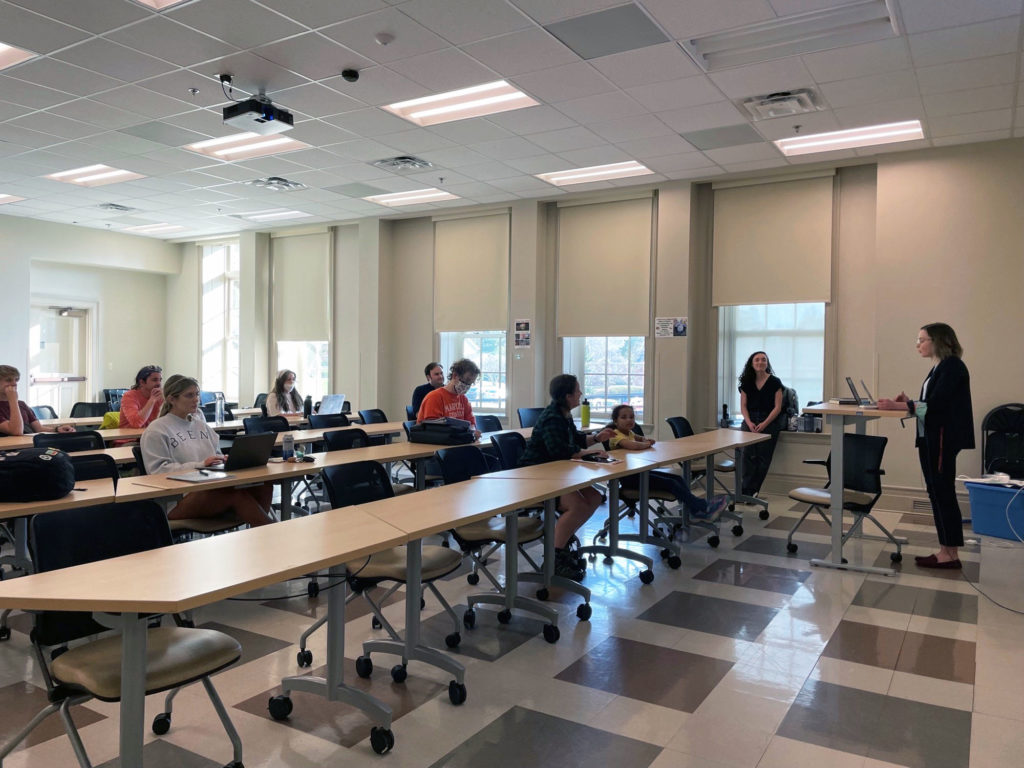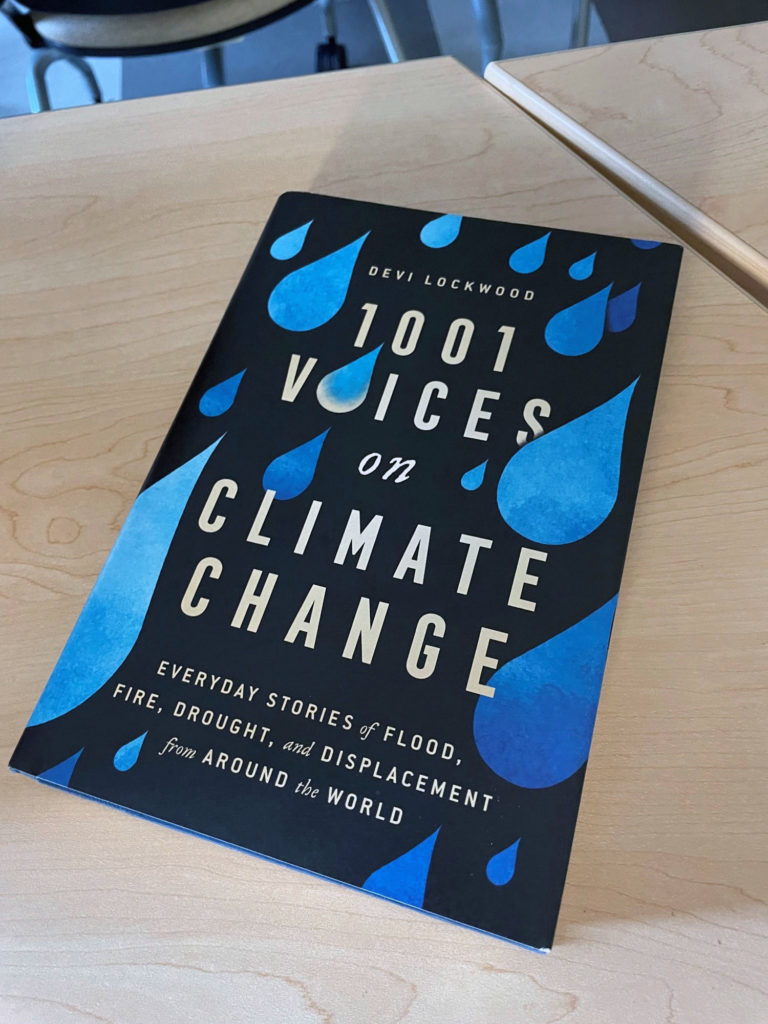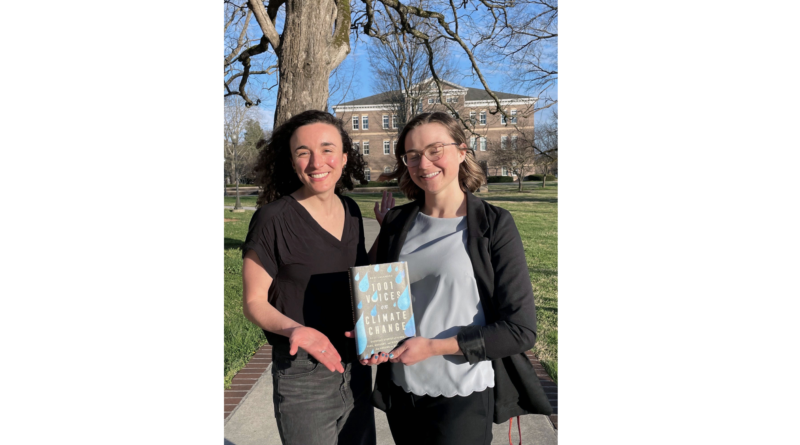“1,001 Voices on Climate Change” uses storytelling to address climate injustice
Author and journalist Devi Lockwood spent five years traveling to 20 countries on six continents with one central purpose– to document stories about climate change and water. Lockwood listened to 1,001 stories about the impact of climate disasters on the lives of people throughout the world.
To capture the stories and lessons she learned from the experience, Lockwood wrote her debut book, “1,001 Voices on Climate Change.” On March 27, in Anderson Hall, an assembly of students, faculty, staff and Maryville community members joined to listen to the incredible journey that inspired Lockwood’s book.

Photo courtesy of Kirsten Sheppard.
In 2013, yearning to reconnect with humanity following an extended period in lockdown after the Boston Marathon bombing, Lockwood tied a sign to her neck inscribed with the words “open call for stories.” This invitation is where her own remarkable story begins.
Having torn her ACL in pick-up soccer the previous summer, Lockwood relied on her bike for daily exercise. Her bike quickly became not only her preferred means of transportation, but also a vehicle for human connection.
“To give myself a goal, I decided that summer that I would ride my bicycle a really long way. I wanted to pedal alongside a river and found that the Mississippi River has a network of roads alongside it called the Mississippi River Trail,” Lockwood shares. “In August 2013, I rode my bike for 800 miles from Memphis, Tennessee to Venice, Louisiana.”
During her trip, Lockwood carried her sign with her and audio recorded the stories of people she met on the road for her senior thesis. Lockwood recounts hearing numerous stories about the intensifying, devastating storms forcing folks out of their homes. These catastrophic events were evidence of climate change.
Once returning to Massachusetts, Lockwood found herself engrossed by the stories she heard on the road. Moved by the impact that climate change had on people locally, Lockwood sought an opportunity to use these stories to create a global narrative.
“I decided to apply for grants that would let me put these stories from the Mississippi River Delta in dialogue with stories about water and climate change from other parts of the world,” Lockwood shares.
She received a grant to travel to Tuvalu, an island country in the South Pacific, for a year, marking the beginning of a five-year-long biking expedition to hear stories about climate change firsthand.
According to Lockwood, the scientific language we use to discuss climate change is often abstract and inaccessible. Too often, it fails to account for lived experiences. Drawing attention to firsthand accounts of climate disasters and the reparations people are making in response to climate change provided an opportunity to bridge that gap.
“Traveling in 20 countries on six continents and listening to 1,001 stories on this topic, I gained a more nuanced understanding of how global this issue is, and also how intimately it impacts peoples’ lives,” Lockwood notes. “It becomes more difficult to ignore climate change when you hear the voice of someone who is impacted.”
Although she did not originally intend to write a book documenting her experience, upon her return, Lockwood recognized the importance of using her privilege and platform as a writer to open up a conversation about environmental injustice and amplify the voices of those affected. Climate change is an environmental justice issue, and storytelling can be an avenue for victims of climate disasters to become an integral part of the conversation on climate change, Lockwood suggests.

Photo courtesy of Kirsten Sheppard.
Lockwood witnessed firsthand the impact of climate disaster and the valiant efforts locals were making to reverse the damage, from stories of a woman restoring a desecrated wetland to a mother making hard decisions about how to use the limited availability of clean water for her family during periods of drought.
Lockwood notes that one of the most valuable tools she unlocked as a documenter in this experience was active listening. Providing space for storytellers to share their lived experiences helps empower those who may have otherwise lacked the power or resources to do so. Lockwood found that many people concluded their story by simply saying to her, “Thank you for listening.”
After her talk, Lockwood opened up the floor for Q&A. Several listeners were interested to hear her perspective on how to mitigate conversations surrounding climate change and environmental injustice, especially as political divides on the issue become more pronounced.
Lack of empathy or understanding can be one of the greatest barriers to achieving meaningful change in environmental justice, Lockwood argues. People need to understand what’s actually happening in communities.
“This means getting past the mundane nature of our everyday lives and recognizing that people’s lived experiences can be vastly different than what we know,” Lockwood notes.
She also advocates for value-based communication when engaging in conversations about climate change, meaning looking for common ground and shared values when navigating difficult discussions about climate change.
While climate change can be an uncomfortable conversation, Lockwood encourages us to sit in that discomfort and welcome that fear into the conversation. An integral part of that process is embracing the stories and lived experiences of those being affected by climate change and providing a platform for them to share those experiences.
If you’re interested in learning more, check out “1,001 Voices on Climate Change,” currently available at the Maryville College library. Her book is also for sale at Southland Books in Maryville.
Additional online resources are available, including her website (devi-lockwood.com).

